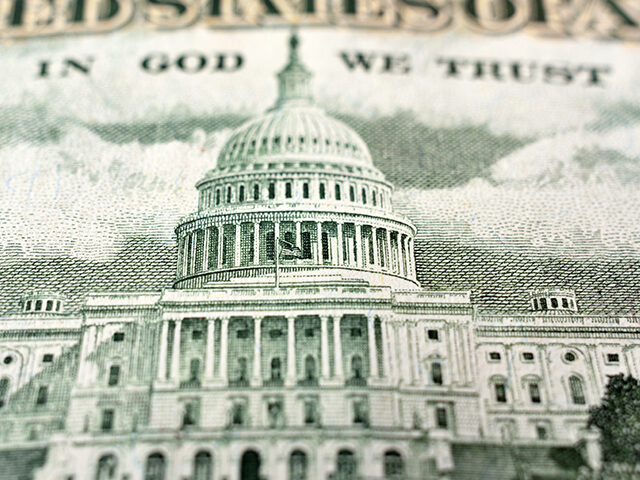No One Buys Treasuries Because of a Rating Agency’s Opinion
If our credit rating is downgraded and no one sells their bonds, does it make a sound?
The United States was stripped of its top-tier sovereign credit rating on Tuesday by Fitch Ratings, which downgraded the country’s debt from AAA to AA+. The immediate reaction in the bond market was a rise in Treasury prices and a decline in yields overnight as a result of a “flight to safety.”
As it turns out, when investors are faced with unexpected turns of events, they typically turn to the safest financial assets in the world—the sovereign debt of the United States. That’s true even when the unexpected event is the announcement of a downgrade of that very debt.
Why? In the first place, no one buys Treasuries based on their credit rating. In some sense, the very idea of rating the credit of the U. S. is an absurd exercise. Unlike bonds issued by corporations or municipalities, very few investors are bound by contract or law to pay any mind to the opinion of a rating agency when it comes to the creditworthiness of the U.S. government. No one builds actual investment strategies based on rating agency opinions of the soundness of Treasuries.
There are interesting questions that follow from the downgrade of the U.S. debt. If the U.S. is not AAA, can mortgage securities backed by government-sponsored entities be AAA? Does it make sense to rate any U.S. based corporation as safer or even as safe as the U.S. government itself? What about corporations and banks that hold excess cash in Treasuries? Should they now be considered riskier? Does China deserve a downgrade because its financial institutions hold so many of the debt instruments of the now-downgraded U.S. government?
There are no real answers to these questions. They are of theoretical interest but will have very little impact on financial markets, corporate results, or national economies. It’s probably best to think of the downgrade as a marketing exercise by Fitch Ratings, a reminder to the investing public and the debt-issuing customer base that Fitch takes its work evaluating credit risk very seriously.

Pedestrians walk past the offices for Fitch Ratings Ltd. in New York City on Feb. 21, 2012. (Scott Eells/Bloomberg via Getty Images)
A Downgrade That Downgrades the Downgrader
Some of the reactions from the establishment media have been comical.
Take, for example, this article from the once-respected news outlet that our colleague John Nolte refers to as CNNLOL:
Fitch Ratings downgraded US long-term debt late on Tuesday from AAA to AA+, citing this spring’s debt ceiling standoff as a major reason.
That’s a huge blow to the US. The global financial system relies on the promise that the US government will always pay back its debts. That trust makes the US dollar the most widely held currency worldwide. This downgrade threatens to complicate that.
Well, no, it does not. The trust that the U.S. will always pay back its debts has not been “complicated” one bit by the downgrade.
You do not have to take our word for it. Here’s how former U.S. Treasury Secretary Larry Summers reacted on the message broadcasting service formerly known as Twitter:
The United States faces serious long-run fiscal challenges. But the decision of a credit rating agency today, as the economy looks stronger than expected, to downgrade the United States is bizarre and inept.
— Lawrence H. Summers (@LHSummers) August 1, 2023
Harvard’s Jason Furman had this to say:
This is completely absurd. And is more likely to show that Fitch is irrelevant to the views of investors in U.S. sovereign debt than it is to show investors anything about the United States. https://t.co/fvYpg7N0hR
— Jason Furman (@jasonfurman) August 1, 2023
In other words, when Fitch purports to downgrade the U.S., the U.S. is not actually downgraded. Fitch itself is.
All This Has Happened Before, All This Will Happen Again
One of the reasons the market has reacted so calmly to the downgrade, of course, is that this is a repeat episode and we know how it ends. When S&P downgraded the U.S. debt a notch back in 2011, there was a lot of uncertainty about what this might mean under financial regulations and how investors might react. The stock market, already on edge because of European debt troubles and a faltering U.S. economy, nosedived. The S&P fell 6.5 percent and did not recover for another six months.
That time around, interest rates on U.S. debt fell with the downgrade, lowering borrowing costs. So the downgrade actually resulted in more demand for U.S. Treasuries.
This time the reaction is far more muted. The initial bid up on long-term Treasuries overnight had somewhat faded by Wednesday morning, as investors realized that they didn’t need to run to safety. The stock market was down but not extraordinarily so. At noon on Wednesday, the S&P 500 was off by just 1.3 percent. The Nasdaq was down by more, but that looks to be rooted in fears that microchip sales may not be as wonderful as the enthusiasts for Artificial Intelligence had hoped.
Perhaps the politicians will delight in aiming their blame-throwers at their rivals over the credit downgrade. For markets and the economy, however, it does not matter.

COMMENTS
Please let us know if you're having issues with commenting.